Trinity College Welcomes 14 New Tenure-Track Faculty Members
Fourteen tenure-track faculty members began new appointments at Trinity College on July 1, 2022, bringing with them a variety of research interests and expertise. According to Dean of the Faculty and Vice President for Academic Affairs Sonia Cardenas, eight of these new faculty members were hired through the college’s Special Opportunity Hiring (SOH) initiative, which was launched last year to help increase faculty diversity.
“Thanks to the hard work of many members of our community, we have hired 14 outstanding new faculty members into tenure-line positions this year,” Cardenas said. “It was a highly competitive job market, and we are quite fortunate to have them joining us. They bring a wide range of talent and perspectives to Trinity in their new roles.”
More than 70 percent of the faculty members hired this year are faculty of color, Cardenas said. “We have completed the second year of a three-year commitment to increase the diversity of our faculty by 18 colleagues hired through the SOH mechanism; to date, 13 of the 18 lines have been filled,” she said.
The 14 new tenure-track faculty members are: Diana Aldrete, Language and Culture Studies and Human Rights; Catina Bacote, English; David Sterling Brown, English; Doyle Calhoun, Language and Culture Studies; Brian Chin, Psychology; Carmen De Schryver, Philosophy; Laura Humm Delgado, Urban Studies; Dang Do, Political Science; Brianna Halladay, Economics; Nikisha Patel, Biology; Blase Provitola, Language and Culture Studies and Women, Gender and Sexuality; Gabriel Salgado, Political Science; Lori D. Watson, Mathematics; and Raul Zelada-Aprili, Economics.
Read more about each faculty member below:
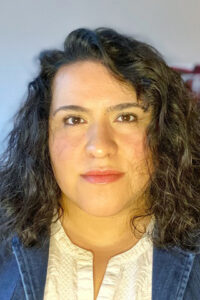
Diana Aldrete
Assistant Professor of Language and Culture Studies and Human Rights
Diana Aldrete began teaching at Trinity College in 2015 as a visiting assistant professor in the Hispanic Studies Program within the Department of Language and Culture Studies. Her research areas include contemporary Mexican literature and culture, and human rights in Latin American literature. An abstract painter and writer, Aldrete’s work focuses on how the arts play a role in questions of human rights.
“I’m excited to continue to work with students in making connections to the topics discussed in our classroom, as they connect to the Hartford community and to the global community,” Aldrete said about beginning the next chapter in her Trinity career. “I am additionally excited to make these connections with projects through my visual art—something I have been developing in the last couple of years.”
Aldrete added, “Students across the world are leading the charge in advocating for future generations. They are increasingly in search of new models to antiquated systems that no longer work and that have brought much of the oppression on our planet and its people. It is my hope that by pointing students to think of art not just as an object of entertainment, but a tool, they can be inspired to one day create the necessary changes for our societies.”
In May 2022, Aldrete’s exhibit Invisible Suffering was on display at Trinity’s Austin Arts Center. She is currently working on a collection of short stories.
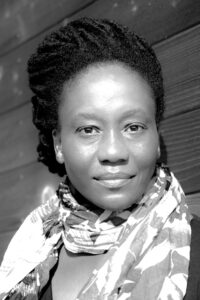
Catina Bacote
Assistant Professor of English
Before joining the Trinity community, Catina Bacote was an assistant professor of English at St. John’s University. Her 20-year career includes work in both education and nonprofits such as directing programs for Facing History and Ourselves.
“I look forward to joining the Trinity English Department because part of its mission is to help students develop their ethical awareness,” Bacote said. “College-wide programs such as the Trinity Social Justice Initiative, the Center for Hartford Engagement and Research, and the Liberal Arts Action Lab make me excited to work with students, faculty, and staff who value collaboration and a social justice approach to learning.”
Bacote’s scholarship is focused on the writer’s voice and how it acts as an ethical pointer in a society where poverty and excessive wealth, political repression, racial segregation, and mass incarceration persist. “Through art, we can raise questions that are genuine and pressing and pursue them with a deep sense of compassion,” she said.
Bacote is a published nonfiction writer whose current book project chronicles the lasting impact of the illegal drug trade on families and communities. Her courses at Trinity focus on creative writing, personal essay and memoir, literary journalism, social justice writing, literature of the African diaspora, and contemporary nonfiction.
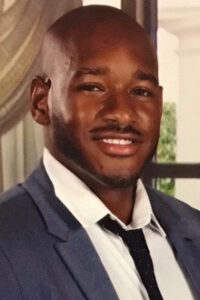
David Sterling Brown ’06
Assistant Professor of English
David Sterling Brown ’06 is excited to be returning to Trinity—his alma mater, where he first fell in love with Shakespeare—as a faculty member. Previously, he was an assistant professor at SUNY-Binghamton; a Scholars and Society Fellow at the Mellon Foundation and American Council of Learned Societies; and an Ann Plato Predoctoral Fellow in English at Trinity. His research areas include Shakespeare, race, gender, and the family.
“I look forward to inspiring future generations of Bantams to take intellectual risks as they discover and pursue their academic passions,” Brown said of his new role. “Moreover, I am looking forward to (re)connecting with the colleagues and staff—at all levels—who make Trinity the magical place that it is.”
Brown’s work focuses on Shakespeare and critical race studies. “In virtually all areas of life, race matters,” Brown said. “The combined study of Shakespeare and critical race studies equips today’s students with a vitally important skillset that enables them to read not just texts but also the world around them.” His antiracist research, which centers on pedagogy and on how racial ideologies circulate in and beyond the early modern period, is published or forthcoming in numerous peer-reviewed and public venues.
“Beyond the study of literature, my scholarship teaches students about navigating life,” he added.
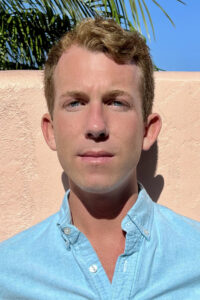
Doyle Calhoun
Assistant Professor of Language and Culture Studies
Having recently earned his Ph.D. in French at Yale University, Doyle Calhoun is eager to join the Trinity College faculty. “I hope to help students develop their skills as critical thinkers and careful readers as part of a broader humanistic project of reading, writing, conversing, and imagining across difference and beyond borders,” Calhoun said.
Calhoun is a scholar and critic working at the intersection of literature, history, media studies, and decolonial theory. His research and teaching focus on the literature and film of West Africa and the Caribbean, especially Senegalese literature in French and Wolof. “Although over half of French speakers worldwide live in Africa, French programs have been slow to adapt to this reality,” Calhoun said. His courses and scholarship encourage students to recognize that French is an African language whose future is being articulated by African and Afro-descended writers.
“I traverse traditional disciplinary and linguistic boundaries. I am especially interested in how literature and film open up new ways of writing history, help us to think through and account for historical and contemporary violence, and manage to voice justice claims where official discourses have failed,” Calhoun said. “I am looking forward to learning from and with Trinity’s diverse community and am especially excited to mentor students and collaborate with faculty in Language and Culture Studies, African Studies, Center for Caribbean Studies, and International Studies. I look forward to teaching a range of courses in French and English that highlight the interconnectedness of Caribbean and African literatures and visual cultures.”
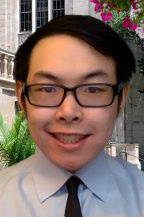
Brian Chin
Assistant Professor of Psychology
Following a postdoctoral fellowship in cardiovascular behavioral medicine at the University of Pittsburgh, Brian Chin brings his research in social relationships, sleep and circadian rhythms, and health and well-being to Trinity.
“I am most excited to engage with Trinity’s students in the classroom and in my Social and Behavioral Health Research Laboratory,” said Chin, who added that he considers teaching and mentoring to be the most rewarding aspects of academia.
Chin strives to promote diversity and inclusion in psychological science. “I look forward to providing supportive mentorship to all students, but especially those from diverse and nontraditional sociocultural backgrounds, as they pursue their academic and professional goals,” he said. “I value the opportunity to conduct this work in a liberal arts environment that values interdisciplinary and engaged learning.”
Chin’s research is guided by the hypothesis that well-functioning social relationships are integral to health and well-being. “My laboratory researches many topics that are relevant to students’ everyday lives and experiences on campus, including close relationships, social interactions, stress and depression, sleep and circadian rhythms, and health behaviors,” Chin said.
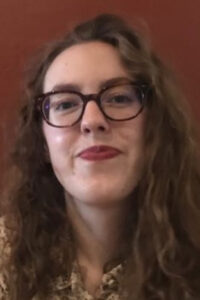
Carmen De Schryver
Assistant Professor of Philosophy
Formerly a visiting assistant professor at Sarah Lawrence College, Carmen De Schryver’s research areas include Africana philosophy, decolonial theory, and 20th century European philosophy, with an emphasis on comparative methodology and canon formation.
At Trinity, De Schryver is looking forward to interacting with students by putting student concerns and questions at the forefront of course design. “I’m also very eager to become involved in the broader teaching community at Trinity and to join discussions about teaching with faculty in a variety of disciplines,” De Schryver said.
“My research is concerned with the conditions of equitable, truth-oriented dialogues,” De Schryver said. “This is a passion I bring to my teaching by promoting a collaborative, democratic atmosphere in which students are encouraged to respectfully listen to and learn from one another. This approach works especially well in a liberal arts environment, where professors can work closely with relatively small groups of students.”
De Schryver promotes an expansive view of what philosophy is and who should be considered—and consider themselves—a philosopher. “Students across the world have been pushing college curricula in a more diverse direction, motivating scholars within the field of philosophy to challenge the Eurocentric nature of the canon,” she said. “I’m very excited to engage Trinity students in ongoing discussions and to join them at the cutting edge of what philosophy will look like in a more equitable, inclusive future.”
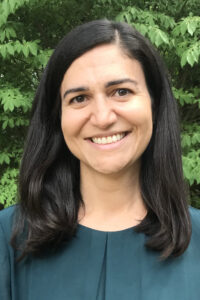
Laura Humm Delgado
Assistant Professor of Urban Studies
Laura Humm Delgado, an urban planning scholar and former practitioner, was a postdoctoral fellow in urban studies at Trinity since 2020. “I have loved teaching at Trinity these last two years and am really excited to continue doing so,” Delgado said. “I have been so impressed with the students; they are passionate, bright, and engaged, and it is clear that they are going to make a difference in the world.” In addition to teaching, Delgado has worked to build relationships with the Hartford community through the Center for Urban and Global Studies and the Center for Hartford Engagement and Research.
Delgado’s research focuses on housing, community development, and socioeconomic and racial inequality. “I have looked at this through the lens of public library services for immigrants, social services, gentrification, affordable housing, and homelessness,” Delgado said. “These are issues that I believe are not only interesting to students, but also which many have experienced or witnessed firsthand in urban environments.”
“Part of what I love about teaching urban studies at Trinity is that everyone has a point of reference when it comes to cities, whether it is from personal experience living in a city, visiting one, or exploring Hartford,” Delgado said. “It is for this reason that I encourage my students to think about housing and community development in the context of their own lives and communities.”
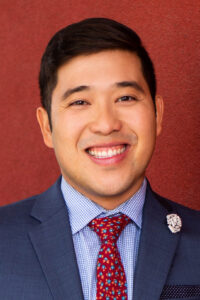
Dang Do
Assistant Professor of Political Science
Before earning his Ph.D. from the University of California San Diego, Dang Do served as a senate fellow in the California State Senate, where he worked to pass bills on topics ranging from human trafficking to educational resources. His research interests lie at the intersection of race and representation in American politics. He explores the factors that induce racial and ethnic minorities to participate in politics and how these groups exert influence through lobbying.
“As a product of a large public university, I’m excited to engage in the more personal and intimate liberal arts college setting,” Do said about coming to Trinity. “I’m looking forward to the smaller class sizes, allowing me to be more inventive and bold in my teaching.”
Do added, “My research studies how marginalized communities, like racial minorities, use existing institutional processes like lobbying to exert influence in a political system stacked against them. We can observe in our society that the fight for racial equity is still ongoing and highly relevant. Issues concerning police violence, economic security, racism, and many more remain important for racial minority communities. For students who identify with racial minority groups or hail from marginalized communities, I hope my research provides an optimistic and pragmatic view on how real change can occur.”
Do will serve as the director of Trinity’s Legislative Internship Program.

Brianna Halladay
Assistant Professor of Economics
Prior to joining the Trinity faculty, Brianna Halladay was an assistant professor of economics at Eastern Connecticut State University. Halladay’s research areas include experimental economics, behavioral economics, and applied microeconomics, including gender differences in competition. She uses her expertise in experimental economics to run small classroom experiments that simulate the economic phenomena about which students are learning. “I believe hands-on experience is one of the best ways to help students have those ‘a-ha’ moments while learning,” Halladay said.
“Often, economics is assumed to be very narrowly focused on money, GDP, and finance,” Halladay added. “At Trinity I am most looking forward to helping students and other members of the college community discover the breadth of economic reasoning and uncovering just how frequently they encounter economic questions in their own lives.”
Halladay said that her scholarship and her teaching support current discussions. “As we see a societal shift toward greater awareness of gender discrimination, especially on college campuses, my research aims at furthering this important conversation, investigating the role for policy improvements, and integrating this knowledge into my life and the lives of my students,” she said.

Nikisha Patel
Assistant Professor of Biology
Before coming to Trinity, Nikisha Patel was a postdoctoral researcher at the University of Connecticut, working on a National Science Foundation-funded project.
Patel’s research and teaching focuses on field and experimental biology involving fern and moss evolution, with a broad interest in plant global biodiversity. Patel’s main objectives in the classroom are not only to foster content mastery in evolution, genetics, and cell biology, but also to ensure that students leave her classes grounded in the application of scientific thinking toward meeting challenges in the world, in their professions, and in their everyday lives.
“I’m really looking forward to working with Trinity’s engaged and enthusiastic students,” Patel said. “I know it will be a pleasure working with students who will challenge me and from whom I can learn. As a field biologist, I hope to keep students engaged and motivated with real-life interaction with nature and natural processes in the field and in the lab.”
“Our changing world and the implications for plant and animal life are at the forefront of challenges faced by the next generation of scientists,” Patel added. “I know that students will be eager to understand these issues and use the foundational knowledge and skills that I can provide in research mentorship and in the classroom in order to find innovative solutions in the future.”
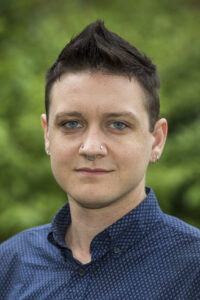
Blase Provitola
Assistant Professor of Language and Culture Studies and Women, Gender and Sexuality
Blase Provitola, who was previously a visiting assistant professor of language and culture studies at Trinity since 2019, focuses their research at the intersection of feminist and gender studies, postcolonial studies, and 20th- and 21st-century French and Francophone studies. They have published on queer and lesbian activism and identity, postcolonial literature, non-binary French, and transgender-inclusive pedagogy.
“I am excited to deepen my connections with students in Language and Culture Studies as well as to get to know new ones through teaching in the Women, Gender, and Sexuality program,” Provitola said. “Having benefited from the small liberal arts college environment as an undergraduate, I look forward to creating such sustained intellectual exchanges with my own students. I also look forward to continuing some of the advocacy work I have engaged in at Trinity to improve the experiences of LGBTQ+ students on campus.”
Provitola believes that students are eager to engage with race, sex, and gender as modes of analysis, and that they are especially excited to understand how those categories are often understood differently in French and Francophone contexts. “Students are also enthusiastic about understanding colonial dynamics—both past and present—in an age of globalization,” they said.
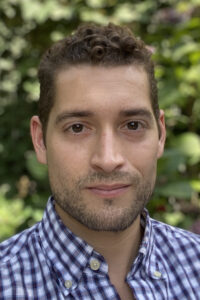
Gabriel Salgado
Assistant Professor of Political Science
Gabriel Salgado comes to Trinity after earning his Ph.D. from the University of Pennsylvania. His teaching and research focus on race, colonialism, and temporality in Latin America. In his current project, he examines the development of race in the early modern Spanish Empire with an emphasis on the racialization of Jewish, Black, and Indigenous peoples.
“In my research and teaching I emphasize how ideas of justice and humanitarianism have been shaped by histories of race and colonialism,” Salgado said. “I have found that students are interested in studying justice, for example, in terms of specific political struggles. In courses like ‘Colonization and the Canon,’ the point is therefore not only to discuss what justice means abstractly, but to ask: justice for whom?”
As a member of the Hic Rosa Collective, Salgado has helped organize sessions of the Falsework School and the Summer Studios in Materialist & Decolonial (MAD) Politics & Aesthetics.
“I am looking forward to being back at a small liberal arts college where, in my experience, conversations that begin in the classroom often extend far beyond it,” he said. “I am also excited to be joining a department with so many colleagues who work on related topics, such as the politics of race and ethnicity.”
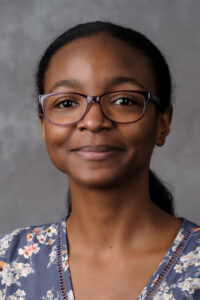
Lori D. Watson
Assistant Professor of Mathematics
After completing graduate school, Lori D. Watson served as a Teacher-Scholar Postdoctoral Fellow in the Department of Mathematics and Statistics at Wake Forest University before coming to Trinity. Her research in pure mathematics, algebraic number theory, and arithmetic geometry focuses on determining solutions to polynomial equations and on understanding families of algebraic curves. Her teaching areas of specialty include number theory and algebra.
Watson believes that each student is capable of learning mathematics and she works to create an environment where students can gain the confidence to tackle new problems. “I am most looking forward to introducing Trinity students to areas of mathematics they may not have encountered before and sharing the beauty of the subject with them,” Watson said. “Mathematics is a diverse subject and I love helping students discover new ways of thinking about and engaging with mathematics.”
Watson said that the subjects she teaches resonate quickly with her students. “Research questions in my area of mathematics are often easy to state, and some of the answers can be found using knowledge students can gain in their first few years of college,” she said. “This gives students many opportunities to contribute original research in my area, even while they are learning some of the rich theory that underlies it.”
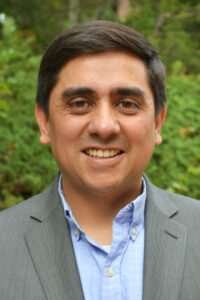
Raul Zelada-Aprili
Assistant Professor of Economics
Raul Zelada-Aprili, who was previously a visiting assistant professor of economics at Trinity since 2019, focuses his research on the intersection of economic development and macroeconomics, with an emphasis on Latin America. He is particularly interested in the relationship between public investment and economic development, and the dynamics of group inequality and poverty.
“I’m excited to be part of Trinity’s community,” Zelada-Aprili said. “I believe that the learning environment that is cultivated in a liberal arts college like Trinity is exceptional in stimulating the development of critical thinking by fostering classroom discussion, participation, and collaboration among students. I’ve enjoyed engaging with Trinity’s students in the classroom and other rewarding mentoring opportunities such as senior theses and Trinity’s Summer Research Program.”
Zelada-Aprili believes in the importance of presenting economic concepts and ideas into a historical and institutional context and exposing students to different theoretical and methodological perspectives. “In my experience, this approach enhances the students’ interest and contributes to their understanding and critical analysis of the subject matter,” he said. “I’m interested in understanding current economic issues such as the macroeconomics of pandemics, and issues that relate economic growth with climate change and inequality. Many of these issues resonate with today’s college students. Students appreciate the opportunity to make sense of current economic events that affect their own lives.”
